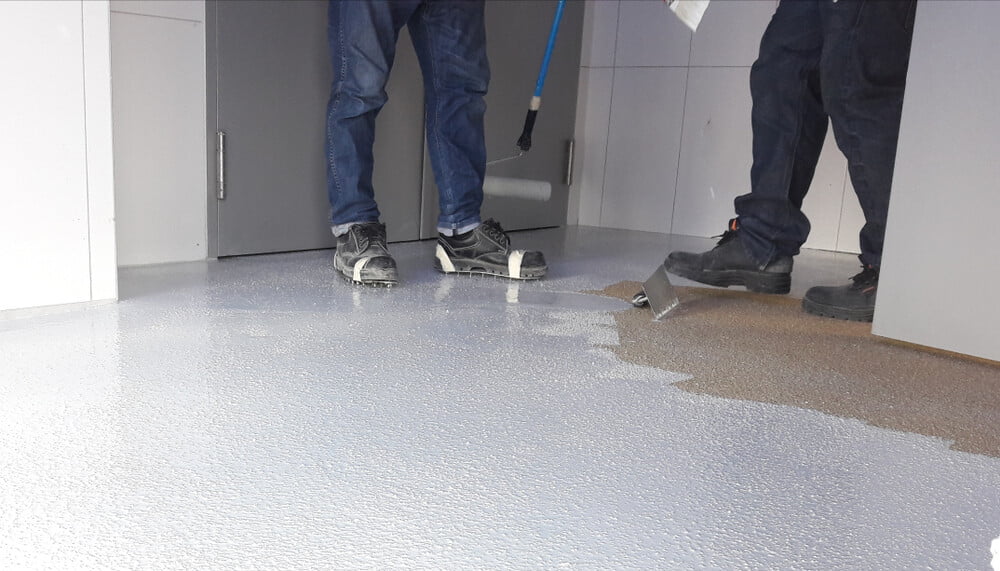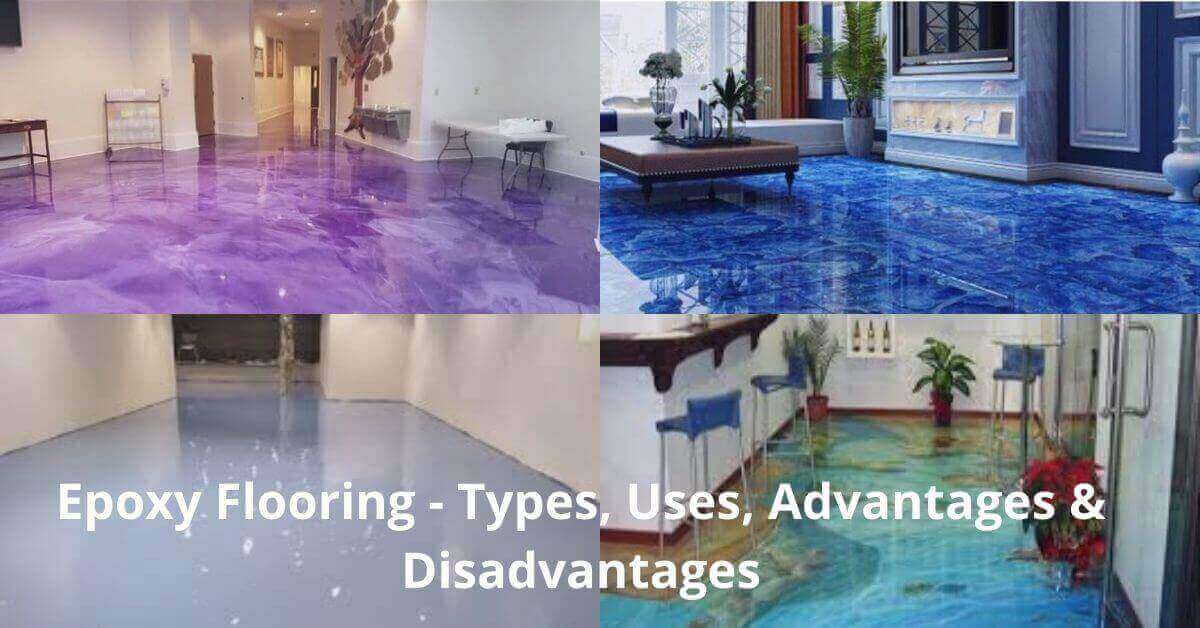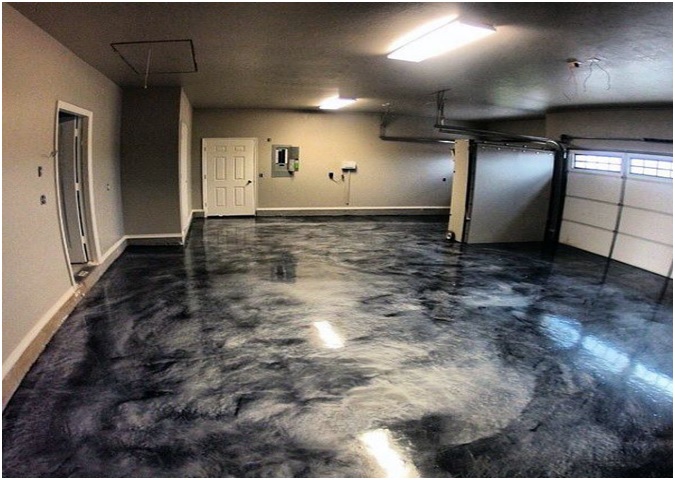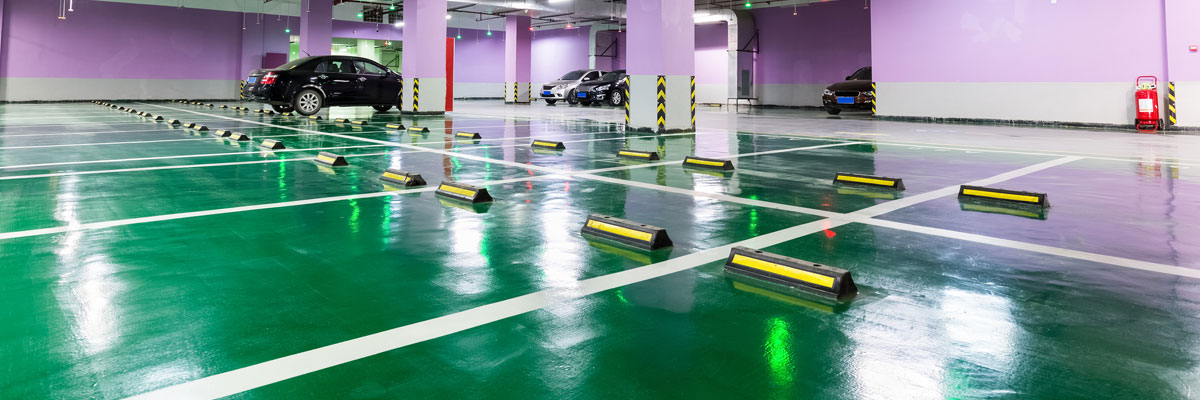When creating sleek and durable flooring solutions, epoxy flooring has been gaining significant attention. Epoxy is a versatile material that offers a range of benefits, but like any choice, it comes with its share of downsides. Let’s dive into the advantages and disadvantages of epoxy flooring, helping you make an informed decision for your next flooring project.
Advantages of Epoxy Flooring
Durability: Epoxy flooring is renowned for its exceptional durability. It’s resistant to impact, chemicals, and heavy foot traffic, making it an ideal choice for commercial and industrial spaces that face constant wear and tear.
Aesthetic Appeal: The glossy finish of epoxy flooring adds a modern and sophisticated touch to any space. It can be customized with various colors, patterns, and even 3D effects, allowing you to create a unique and eye-catching design.
Easy Maintenance: Cleaning epoxy flooring is a breeze. Its seamless and non-porous surface doesn’t allow dirt, dust, or liquids to penetrate, making it simple to sweep, mop, or even use a machine scrubber.
Chemical Resistance: Epoxy’s resistance to chemicals, oils, and stains makes it a preferred choice for garages, laboratories, and industrial facilities where spills are a common occurrence.
Longevity: With proper installation and maintenance, epoxy flooring can last years without showing signs of deterioration, making it a cost-effective investment in the long run.
Disadvantages of Epoxy Flooring
Installation Complexity: While epoxy flooring is durable, its installation requires careful preparation and professional expertise. Improper installation can lead to bubbling, peeling, or an uneven finish.
Slippery When Wet: Epoxy flooring can be slippery, especially when wet. Adding slip-resistant additives can mitigate this issue, but it’s a consideration for spaces prone to moisture.
UV Sensitivity: Direct sunlight exposure can cause the epoxy to turn yellow and degrade over time. This makes it less suitable for outdoor applications or areas with abundant natural light.
Temperature Sensitivity: Extreme temperature fluctuations can impact the performance of epoxy flooring. It may crack or peel in environments with significant temperature variations.
Preparation Time: The installation process of epoxy flooring requires thorough surface preparation, including cleaning, repairing cracks, and ensuring proper adhesion. This preparation phase can prolong the installation timeline.
Epoxy flooring offers a balance of strengths and weaknesses, making it suitable for various applications. Its durability, aesthetic versatility, and easy maintenance are attractive, especially for high-traffic and industrial spaces. However, its installation complexity, potential slipperiness, and sensitivity to UV and temperature changes should be carefully considered. As with any flooring decision, it’s crucial to assess your specific needs and preferences to determine whether epoxy flooring aligns with your goals for a functional and visually appealing space

Pros And Cons Of Epoxy Floors Concrete Polish Royal Coating Supply
Understanding the Pros and Cons of Epoxy Floors
Understanding The Pros and Cons of Epoxy Flooring – Floorcube
7 Factors that cause Epoxy Floors to FAIL
Epoxy Flooring – Types, Uses, Advantages u0026 Disadvantages – Civil Lead
What are the drawbacks of having garage epoxy flooring? – Rep House
Pros And Cons Of Epoxy Flooring Epoxy Flooring Detroit, MI
Epoxy Flooring Epoxy Flooring India Epoxy Flooring Advantages Disadvantages Cost
Related Posts:
- Epoxy Basement Floor DIY
- High Gloss Epoxy Floor
- Decorative Epoxy Flooring
- Epoxy Floor Garage DIY
- DIY Epoxy Kitchen Floor
- Best Epoxy Floor Paint For Garage
- DIY Epoxy Garage Floor
- Metallic Epoxy Floor
- DIY Garage Epoxy Floor
- Indoor Epoxy Flooring
Epoxy Flooring: Advantages and Disadvantages
Epoxy flooring is a popular choice for many residential and commercial buildings. It is a highly durable, waterproof, and low-maintenance flooring option that can last for decades with proper care. However, like any type of flooring, there are both advantages and disadvantages associated with epoxy flooring. In this article, we will explore the pros and cons of this unique flooring option to help you decide if it’s the right choice for your home or business.
Advantages of Epoxy Flooring
The biggest advantage of epoxy flooring is its durability. Epoxy floors are designed to last for decades, even in high-traffic areas. It is highly resistant to scratches and wear and tear, making it perfect for areas that experience a lot of foot traffic. Additionally, epoxy floors are easy to clean and maintain.
Epoxy floors are also quite affordable compared to other types of flooring. Installing an epoxy floor may cost up to 40 percent less than other options like tile or hardwood. Plus, it is easy to install and can be done quickly in a single day.
Finally, epoxy floors come in a variety of colors and finishes, so you can customize the look of your space. You can choose from solid colors, metallic finishes, or even glittery finishes to make your space truly unique.
Disadvantages of Epoxy Flooring
The biggest disadvantage of epoxy flooring is that it cannot be repaired once damaged. If there is a crack or chip in the surface, it must be replaced entirely. Additionally, epoxy floors can be slippery when wet which makes them unsuitable for bathrooms and other wet areas.
Another issue with epoxy flooring is that it requires regular upkeep to maintain its appearance. Over time, the finish may become dulled or scratched leading to a need for refinishing or replacing the surface completely. Finally, the fumes associated with applying the epoxy can be hazardous if not handled properly. It is important to wear protective gear such as a respirator during installation and keep the area well-ventilated while the epoxy is drying.
FAQs
Q: How long does epoxy flooring last?
A: With proper care, epoxy floors can last up to 30 years or more.
Q: Is epoxy flooring expensive?
A: No, when compared to other types of flooring such as tile or hardwood, epoxy floors are quite affordable and can cost up to 40 percent less than other options.
Q: Is epoxy flooring safe?
A: Yes, when installed properly and used in accordance with safety guidelines, epoxy floors are safe for use in most residential and commercial settings. However, always wear protective gear such as a respirator when applying the epoxy and ensure that the area is well-ventilated until it has dried completely.







